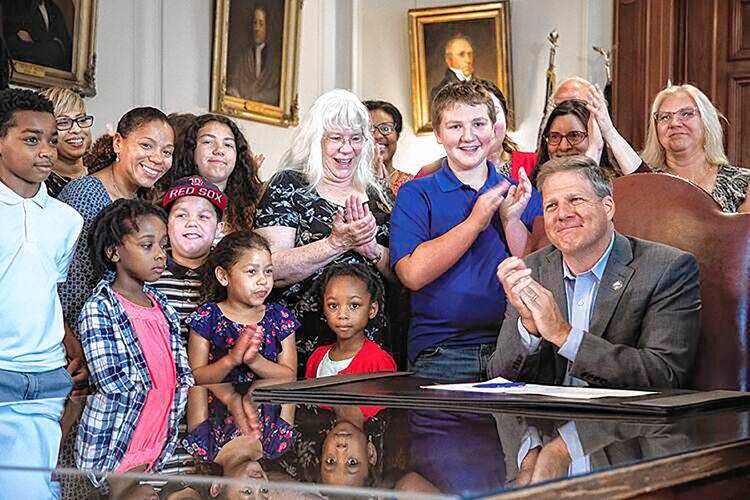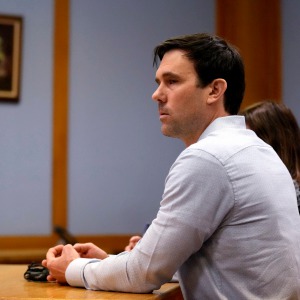Column: The history behind New Hampshire education freedom accounts
| Published: 02-23-2024 5:18 PM |
It was distressing, but not surprising, to read that the New Hampshire Legislature is considering an increase in funding for Education Freedom Accounts by raising the eligibility ceiling to $150,000 per year for families of four who want to secure grants to homeschool their children or enroll them in private schools.
I was distressed because if this legislation is enacted, it will drain millions of dollars from the Education Trust Fund, the source of adequacy grants designed to provide more equitable funding for public schools across the state.
I was not surprised because New Hampshire’s Education Freedom Accounts are the inevitable result of the undercutting of government that began during Ronald Reagan’s presidency and has been the centerpiece of conservatism ever since. One of Reagan’s most famous quotes, “The nine most terrifying words in the English language are: I’m from the government, and I’m here to help,” captured the attitude of the Republican party toward public service at that time, an attitude that has only gotten worse. By making “inefficient government” the enemy and “cost effective businesses” the protagonist, Reagan implicitly encouraged the privatization of public services.
Over time, this perspective was adopted by both political parties, with Republicans wanting to make the government “small enough to drown in a bathtub” and Democrats advocating “public-private partnerships.” In public education the privatization movement led many school boards to outsource services such as transportation, school lunches, custodial and maintenance staffing, accounting and payroll functions, nursing and special education.
During this same period, voters adopted the view that publicly funded organizations should be “run like a business,” that they should be “responsible for the quality of their product.” This led to the emergence of the accountability movement in public education, whereby schools would be graded based on how well their students performed on standardized tests.
After a succession of false starts at setting federal quality standards for schools, George W. Bush gained bipartisan support for his “No Child Left Behind” Act (NCLB), which required each state to develop high-stakes tests that would identify “failing schools.” If those schools failed to improve after intervention, parents with children in those schools would be offered alternatives. The underlying premise of NCLB was that parents of children who were “trapped in failing schools” would be able to choose a more successful one for their children.
What happened next was completely predictable: the schools serving children raised in poverty and/or grossly underfunded schools were identified as “failing,” funds to help those schools were non-existent, and, the bipartisan coalition that passed NCLB vanished. In 2009, the Obama administration launched “Race to the Top”, a competitive grant program designed to spur and underwrite reforms in state education departments and local school districts. Using $4.35 billion of the stimulus funds approved by Congress to address the Great Recession, Obama hoped the Race to the Top grants would turn around the “failing schools.” However, by the end of his administration, over 30% of the nation’s schools were still “failing.”
In 2015 Congress reached a bi-partisan agreement on education policy by passing the Every Student Succeeds Act, which aspired to advance equity by “setting high standards” for all students and “returning decision-making back to local educators, families, and communities.” The teacher’s unions appreciated the role educators were expected to play and local school boards appreciated the reference to the role communities would play. But it was the conservative state legislators who appreciated this new law the most. By focusing on the reference to the role of families, states with GOP legislatures and governors enacted a series of “choice” laws that undercut both the teachers unions and local school boards. Using model legislation developed by the American Legislative Exchange Council (ALEC), a nonprofit organization underwritten by wealthy backers like the Koch brothers, conservative legislators enacted bills that expanded school choice through grants funded by “Education Savings Accounts” or ESAs. The first state laws funded the grants from a pool of money generated by tax-deductible donations made by investors seeking tax shelters. By using voluntary donations to underwrite the grants that provided parents with options to “failing” public schools, legislators could “advance equity” without raising taxes.
Article continues after...
Yesterday's Most Read Articles
New Hampshire’s version of ESAs, the “Education Freedom Accounts” (EFAs), were far worse for taxpayers because they did not rely solely on voluntary contributions. Instead, New Hampshire’s EFA grants drew predominantly from state funds earmarked for public schools. Worse yet, 72% of the EFA grants went to parents whose children were already enrolled in a private school or already homeschooling their children. In the words of NEA-NH President Megan Tuttle, New Hampshire’s EFA grants “take scarce funding away from public schools and give it to private and religious schools that are unaccountable to the public.”
In a state where the Supreme Court has repeatedly determined state funding for education is insufficient and inequitably distributed it is difficult to justify the diversion of any taxpayer funds dedicated to public schools. Diverting those funds to pay the expenses of parents who choose to homeschool their children or pay tuition to religious-affiliated schools shifts the costs for public education to local property taxes.
If Gov. Chris Sununu and Republican legislators want to provide aid to parents who homeschool their children or enroll their children in religious schools, they should do so explicitly and not through a Byzantine mechanism like EFAs. Forbes Magazine reported earlier this month that New Hampshire’s Public Schools were ranked the fourth best in the nation based on standardized test scores. Given this performance, it strikes me that the Legislature should invest more in the exceptional public education system it already has rather than spending it on homeschooling and private schools.
Wayne Gersen is a retired school superintendent. He lives in Etna.



 Editorial: Parker parole a reminder of how violence reshapes our lives
Editorial: Parker parole a reminder of how violence reshapes our lives Editorial: Chris Sununu’s moral vacuum
Editorial: Chris Sununu’s moral vacuum Editorial: Gambling tarnishes America’s sporting life
Editorial: Gambling tarnishes America’s sporting life By the Way: A white nationalist’s many mistruths
By the Way: A white nationalist’s many mistruths
